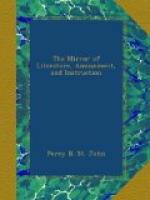A bow, said to have belonged to Little John, with the name of Nayler upon it, is now in the possession of a gentleman in the West Riding of Yorkshire.[6] SWAINE.
[6] Sir George Armitage, of
Kirklees Hall.—See Mirror, vol.
xix. p. 322.
* * * * *
NEW BOOKS.
* * * * *
ELEMENTS OF CHEMISTRY.
[This is one of the Naturo-Philosophical volumes of the Cabinet Cyclopaedia, and is therefore to be viewed as a portion of that series rather than as a substantive work. Its preparation has been entrusted to Mr. M. Donovan, Professor of Chemistry to the Company of Apothecaries in Ireland; so that it comes to us with some share of recommendatory experience on the part of the editor. It would, however, be difficult to point out the advantages of Mr. Donovan’s volume over others of the same description. Neither will such distinction be looked for but in a scientific journal. The arrangement is clear and satisfactory; the manner plain and illustrative; and the matter in accordance with the science of the present day; though in a few cases the nomenclature is somewhat overloaded with hard names, and presumes more previous acquaintance with the subject than is consistent. We subjoin a few extracts of popular interest.]
Caloric, or the matter of Heat.
Heat is admitted by the philosophers of the present day to be the principle concerned in repulsion; and heat and cold are known to produce expansion and contraction in all bodies. Heat is, therefore, the antagonist of cohesion. Chemists have thought it necessary to make a distinction between the senses in which the word heat may be taken. In its usual acceptation, it merely means the effect excited on the organs of




